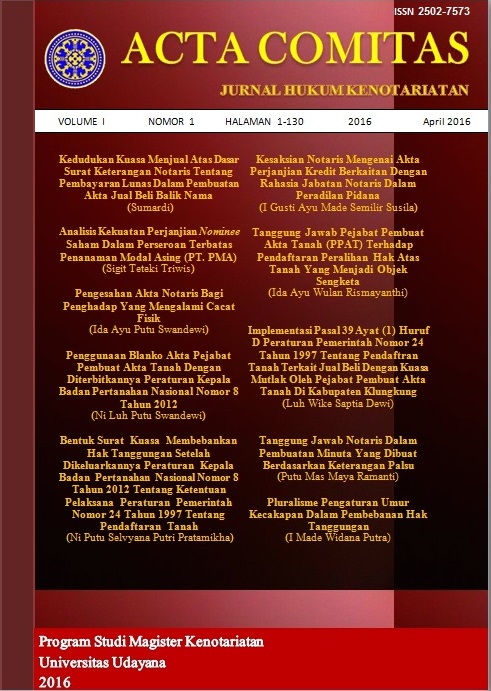Implementasi Pasal 39 Ayat (1) Huruf d Peraturan Pemerintah Nomor 24 Tahun 1997 Tentang Pendaftaran Tanah Terkait Jual Beli Dengan Kuasa Mutlak Oleh Pejabat Pembuat Akta Tanah Di Kabupaten Klungkung
Abstract
The Land Deed official (the PPAT) is a public official given the authority to make an authentic document related to the conveyance of land. In the land conveyance, many parties employ a power of attorney or a proxy to represent him or herself in committing an act of law, one of which is the act of buying and selling of land. The problem formulation of this thesis is how the implementation of the provisions of article 39 paragraph (1) letter d of the Government Regulation Number 24 of 1997 about the practices of making the land sale deeds by the PPAT in the Klungkung Regency, and what the responsibilities of the PPAT in carrying out their duties as officials who make the land sale deed based on an absolute power of attorney. The research methodology used in the study is juridical empirical research. It can be seen from the scope of discussion namely on what is written in the legislation (das sollen) and the deviations found in the practices of making the land sale deeds made by the PPAT (das Sein). This thesis uses the nullification, the legal affectivity, the responsibility, and the law enforcement theories.
The findings of the research showed that there were some irregularities of the implementation of Article 39 paragraph (1) letter d related to the land sale deed by an absolute power of attorney found in the Regency of Klungkung, for instance, there was an indication that a PPAT accepted a privately-made absolute power of attorney to make a land conveyance certificate. This was made because of the creditor's debt agreements. Other irregularities found, that there was a land conveyance certificate made under a stand-alone power of attorney that irrelevant to the land deed of sale. The accountability of a PPAT who accepts an absolute power of attorney in making the land conveyance certificate lies exclusively on his/her own discretion because the PPAT is not under a government agency. It is always possible that those who feel harmed by the malpractice shall be entitled to a civil action for redress. By the routine monitoring and guidance, it is expected that no violations shall be committed by the PPAT otherwise, he or she may be exposed to a lawsuits in the future.Downloads
Keywords

This work is licensed under a Creative Commons Attribution 4.0 International License.






